Commercial spaces face significant challenges from ant infestations due to their appeal as food, water, and shelter sources. Early detection through inspections and strict hygiene protocols is crucial. Sealing entry points, regular cleaning, and professional pest control services specializing in ant control are recommended for effective treatment and tailored prevention strategies. Understanding ant behaviors and species variations aids in implementing appropriate control methods for commercial spaces. Non-chemical methods like heat treatments and baiting systems offer humane and environmentally friendly solutions. Chemical solutions require professional expertise for safe and precise application. A multi-faceted approach, including preventive measures and strategic use of baits, ensures an ant-free environment for businesses, maintaining hygiene and customer satisfaction.
“Ant infestations in commercial spaces can disrupt operations, damage reputation, and pose health risks. Understanding ant behavior and identifying entry points is crucial for effective ant control. This article delves into these aspects, offering insights on non-chemical methods, chemical solutions (with safety guidelines), preventive measures, and when to engage professional pest control services. Armed with this knowledge, businesses can implement robust ant control strategies.”
Understanding Ant Infestations in Commercial Spaces
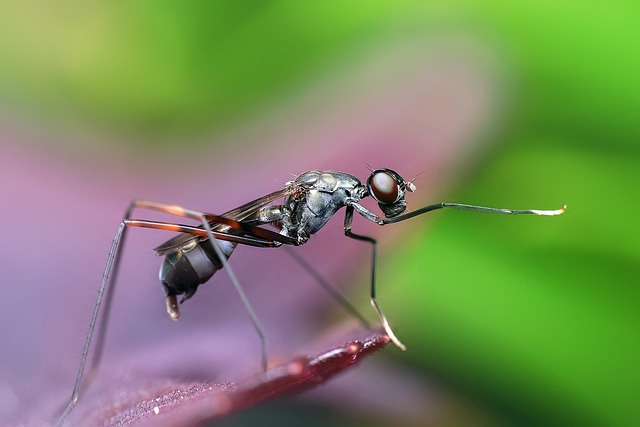
Ant infestations in commercial spaces can quickly become a significant problem, impacting the cleanliness and efficiency of operations. Understanding these invasions is the first step toward effective ant control. Businesses, especially those in food service or retail, must recognize that ants are attracted to sources of food, water, and shelter—all of which are common in commercial settings. They can enter through various means, from open doors and windows to hidden cracks and crevices, forming complex nests within the building structure.
Regular inspections are key to early detection. Commercial spaces should implement strict hygiene protocols, ensuring food is stored securely and waste is promptly removed. Addressing any visible ant trails or signs of infestation immediately can prevent the problem from escalating. Engaging professional pest control services that specialize in ant control is also advisable for thorough treatment and prevention strategies tailored to the specific species and unique characteristics of the commercial environment.
Identifying Common Ant Entry Points in Businesses

Ants are persistent invaders that can quickly establish colonies within businesses, causing disruptions and potential damage. Identifying common entry points is a crucial step in implementing effective ant control strategies. These insects are adept at finding their way into buildings through various means, often exploiting even minor gaps or cracks. Common access points include doors, windows, utility pipes, and structural openings.
By understanding these entry points, business owners can take proactive measures. Sealing gaps with caulk, installing weatherstripping on doors and windows, and ensuring proper ventilation can significantly deter ants. Regular inspections are also vital to identifying new or hidden entryways, allowing for swift action using appropriate ant control methods like baiting systems or professional pest control treatments.
The Impact of Ants on Commercial Operations and Reputation

Ants, though small in size, can cause significant disruptions and financial losses for businesses. Their ability to infiltrate commercial spaces and quickly establish colonies can lead to a range of issues that impact operations and customer perception. These invasive pests can contaminate food sources, damage structures, and disrupt productivity by infesting essential equipment and supplies.
The presence of ants in a business setting not only creates an unsanitary environment but also reflects poorly on the company’s reputation. Customers and partners may view the establishment as careless or unprofessional if ant infestations are not promptly addressed. Effective ant control measures become a strategic necessity to safeguard operations, maintain customer satisfaction, and preserve the business’s public image.
Types of Ants and Their Behavioral Patterns
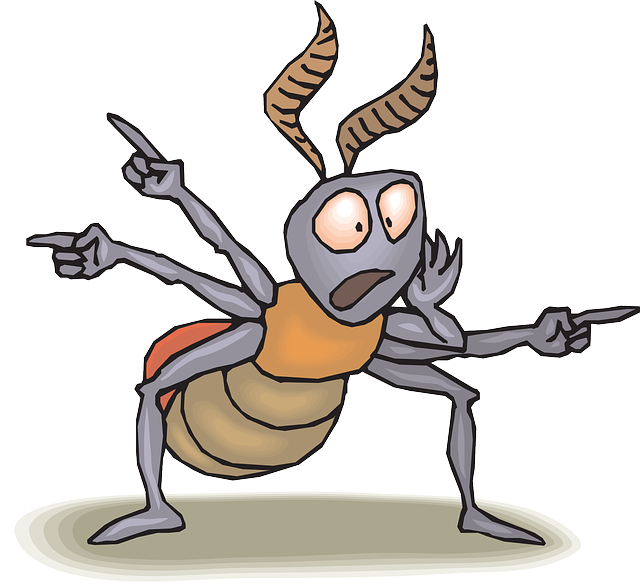
Ants are highly organized social insects, living in complex colonies with distinct roles for each member. Understanding these behavioral patterns is crucial when it comes to effective ant control strategies for businesses. Different ant species exhibit unique behaviors, which can vary based on their environment and food sources. For instance, common types include the Caribbean crazy ants, known for their rapid movement and tendency to follow pheromone trails left by other ants; and fire ants, which are aggressive and form supercolonies with millions of workers.
Some species prefer indoor environments, attracted by food remnants or moisture, while others are more inclined towards outdoor areas, seeking nectar or protein sources. Their nesting habits also differ; some ants build their nests in soil, while others occupy abandoned structures or even tree cavities. Recognizing these variations is key to implementing targeted ant control measures for businesses, ensuring the safety and hygiene of commercial spaces.
Non-Chemical Methods for Effective Ant Control
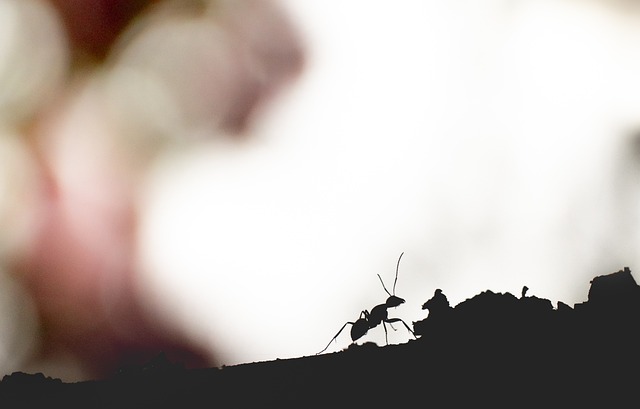
Non-chemical methods offer a humane and eco-friendly approach to ant control, ideal for businesses aiming to maintain a clean and sustainable environment. Techniques like heat treatment and baiting systems are highly effective. Heat treatments use controlled temperatures to eliminate ants without harming other pests or the environment, making it a safe option for food establishments. Baiting systems involve placing food traps that attract ants, which then carry the poison back to their colonies, reducing the population over time.
These non-chemical strategies not only help control ant infestations but also prevent future ones by addressing the source of the problem. For businesses, this means reduced reliance on chemical pesticides and a more comprehensive pest management strategy. By adopting these methods, companies can ensure a safer working environment for employees and customers while maintaining their commitment to ecological responsibility.
Chemical Solutions for Ant Management: Safety and Application
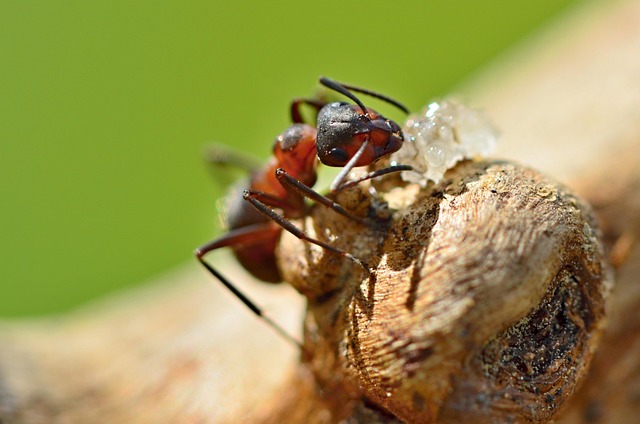
Chemical solutions have long been a go-to method for ant control, offering effective management strategies for businesses dealing with infestations. However, their application requires careful consideration and professional expertise to ensure safety and minimize environmental impact. Common chemical treatments include baits, dusts, and liquid sprays, each designed to target ants specifically. Baits, for instance, are a popular choice as they attract worker ants, which then carry the pesticide back to the colony, effectively eliminating it from within.
Safety is paramount when employing these methods. Professional pest control services understand the importance of using protective gear and following strict protocols to prevent exposure to employees and customers. They also ensure that chemicals are applied accurately, focusing on areas where ants are present or likely to invade, such as entry points and trails. This precise approach minimizes the use of pesticides, reducing potential risks and environmental pollution associated with chemical solutions for ant control.
Preventive Measures to Maintain an Ant-Free Environment
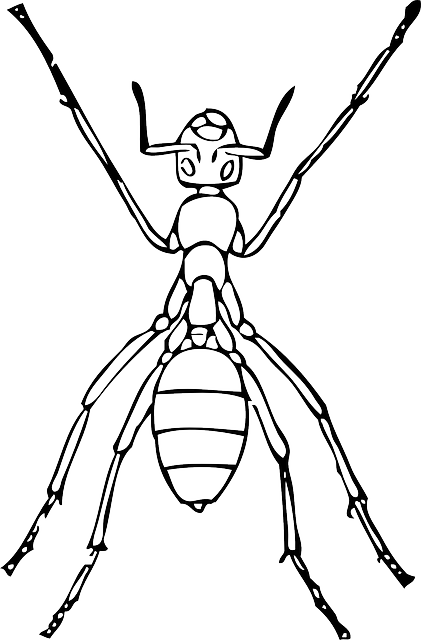
Maintaining an ant-free environment for businesses is a multi-faceted approach starting with preventive measures. Regular cleaning and sanitizing are paramount, especially in areas where food is prepared or stored. Sealing entry points such as cracks and gaps around doors, windows, and utility pipes can significantly reduce the risk of ant infestation. Proper waste management, including timely disposal of garbage and recycling, eliminates potential food sources that attract ants. Additionally, keeping outdoor areas clean and free from debris creates a less inviting environment for these pests.
Using baits strategically in high-risk areas can also be effective. These baits, when left undisturbed, lure worker ants back to their colonies where they share the toxic substance with their queen and other ants, helping to eliminate the entire colony. It’s important to consult with a professional pest control service to determine the most suitable preventive measures for your specific business needs and to implement them consistently to prevent ant control issues.
Professional Pest Control Services: When to Hire Experts
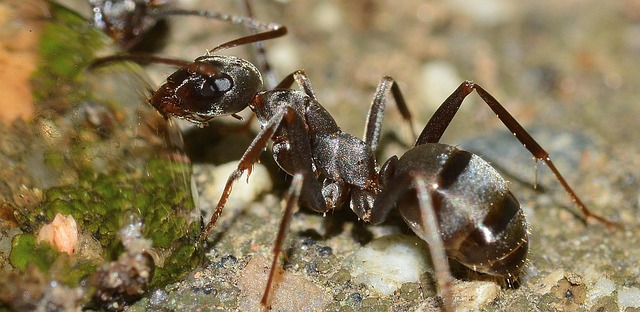
Ant control is a critical aspect of maintaining a professional and hygienic environment for businesses. While some ant infestations can be managed through DIY methods, hiring expert pest control services is essential when dealing with severe or persistent issues. Professional exterminators have the knowledge, tools, and experience to identify ant entry points, locate nests, and employ targeted treatments that are both effective and environmentally responsible.
Choosing the right time to call in experts is crucial for successful ant control. Signs like ants entering your facility in large numbers, visible nesting sites, or a sweet scent indicating pheromone trails suggest an established infestation. Prompt action can prevent these tiny invaders from causing significant damage to property and disrupting business operations.
